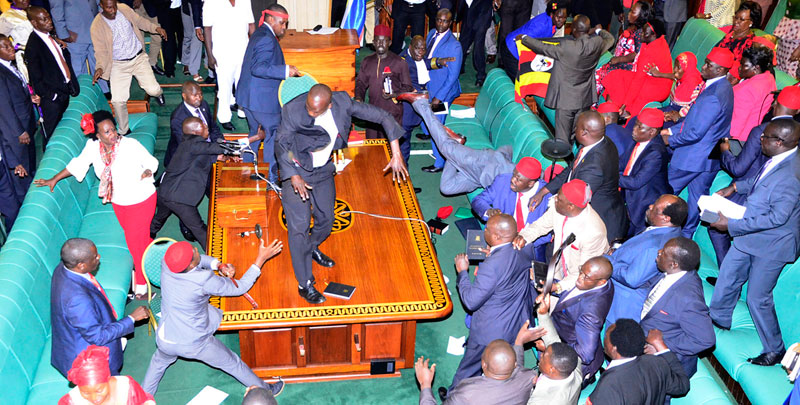Columnists
We all lie; Why do politicians lie a lot?
Age Limit Debate: Many MPs & their well-off supporters are engaging in what economists call “preference falsification” – the act of misrepresenting one’s genuine wants under social pressures!
In the annals of history there are big political lies. Some were about things as substantive as people’s lives, their future and even God! From the ‘Nazi Propaganda’ orchestrated by Adolf Hitler and Joseph Goebbels, his minister of propaganda in 1930s, to former U.S. President Richard Nixon’s Watergate, the world has seen big political lies.
In recent years, George W. Bush claimed, “God told me to end the tyranny in Iraq.” Bill Clinton lied (under oath!) that he did not have an affair with Monica Lewinsky, a White House intern.
I know in Uganda (or generally in Africa) this is an endnote for lies. Here, a man, more so a powerful one, without a mistress is not man enough. Ours have them in hoards!
In Uganda, our lies come in bigger bundles. President Museveni has told us several things that turned out to be lies. He promised, on camera, to step down once he turns 75 – the Constitutional age limit for President. He had already made several other promises that he did not fulfil. Some were even in writing!
His perennial challenger, Dr. Kizza Besigye, is not spotless either. He lied in 2013 that he will not stand again for presidency. Two years later, he surprised many, including his wife, the principled Hon. Winnie Byanyima (she twitted), when he picked the forms to contest again.
Bold-faced lies
Many of Besigye’s supporters did not see that as a big lie, after all President Museveni had also, on several occasions, reneged on similar promises. Some actually believed it’s permissible for someone to change their mind. That is where the problem begins.
Other ‘small’ politicians have also told some ‘little’ lies or ‘big’ ones that we can hardly remember mainly because they were told by inconsequential politicians. Undoubtedly, the euphemism that our politicians use for what are bold-faced lies is legendary.
To be fair, though, sometimes politicians say some truth. For example, our President recently said, “I am not your servant. I am serving myself.” In December 2015, while campaigning in Namutumba District (during the 2016 Presidential elections) the President said another truth, “…you hear people say ‘Museveni should go’. But go and leave oil money?”
Surprisingly, when the President says the truth, Ugandans do not want to hear it either. In writing this, I thought of maintaining a neutral and purely analytic stance (as academics are expected to behave).
But then I remembered Dante Alighieri’s assertion, “The hottest places in hell are reserved for those who, in times of great moral crisis, maintain their neutrality.”
Four questions
Desmond Tutu took it one notch higher, “If you are neutral in situations of injustice, you have chosen the side of the oppressor. If an elephant has its foot on the tail of a mouse, and you say that you are neutral, the mouse will not appreciate your neutrality.”
It’s, therefore, natural for anyone who doesn’t want to go to hell – and I really fear hot things – to pick a side in this debate. Four questions guided my choice: 1) why do politicians lie? 2) why do successful politicians lie a lot? 3) why do people let politicians lie to them? 4) why do we entertain individuals that engage in “motivated reasoning” on behalf of dishonest politicians?
I will start from the end. According to psychologists, ‘motivated reasoning’ is when people form and cling to false beliefs despite overwhelming evidence. Such people seek out only information that confirms what they already believe.
To buttress their ‘motivated reasoning’, such individuals engage in “selective perception” – the tendency not to notice anything that may contradict their prior beliefs.
For example, I know many friends of mine who have chosen to ignore the weaknesses of their favourite politicians, and also not notice the good qualities of their favourite politician’s opponents. I often ask myself, is this what politics is all about?
Annoying agreement
The few classes I took in philosophical economics taught me that politics is about interests, most of which are personal and related to money – power, status, perks, respect and security.
President Museveni and his followers in yellow want to remove the 75 year age limit from the Constitution. Their goal is clear: they want to continue in power which brings them money, status, perks, and security.
The opposition politicians and their followers want the age limit clause maintained. Their goal? To stop Museveni from standing again, in the hope that they will get a chance of winning the power and all its attendant imports.
Of course there are a few people whose main interest is to see rule of law maintained by respecting what the Constitution stipulates. Those are morally upright citizens who believe in justice, equity, and honesty.
Academics, philosophers, and political commentators reached an annoying agreement – politicians lie because they have to. This now brings me to answering the first three, of the four, questions that guided my choice in the age limit debate.
Private truths, public lies!
When I was in graduate school, I read a book, “Private Truths, Public Lies,” written in the year Uganda’s current government promulgated the constitution they are so determined to amend into a new manuscript – 1995.
The author of this fascinating book, Timur Kuran, is a Turkish American economist now credited for having introduced one of the most elegant and penetrating theories of political economy.
Kuran coined a new economic term, “preference falsification.” To understand the meaning of this terminology, let us use a familiar analogy. I guess you have ever been at a dinner party or a date, and your boss or fiancé asks if you are having a good time.
Although the tastelessness of the food is matched only by that of the guests, you remark with all the ‘sincerity’ and enthusiasm on your face how you are delighted to be in attendance.
If you are the kind that doesn’t do parties—a hermit of sorts—you have at least hosted a visitor who, on top of not showing any signs of leaving, loves to hold on to the TV remote to watch translated soaps on Bukedde TV. You may choose to keep them company and watch along with them rather than reveal your preference for F1 or Discovery Channel.
Preference falsification
Whether for fear of some setback to one’s material prospects (the case of your boss) or from apprehension about what others might think of you (the case of a fiancé or a visitor), the gate to the recesses of one’s beliefs and attitudes may be kept securely locked.
This is what Kuran refers to as preference falsification – the act of misrepresenting one’s genuine wants under perceived social pressures. He argues that even formally ‘free’ citizens can be socially pressured into ‘living a lie,’ publicly justifying things that they privately reject, even abhor.
We have all at one time claimed support of something publicly even though we don’t support it privately. Except for a handful, many people care much more about their own survival and acceptance than about the particular political leadership of their government.
Kuran’s research finds some important facts: first, a common effect of ‘preference falsification’ is the preservation of widely disliked structures. Second, conferment of an aura of stability on structures vulnerable to sudden collapse, such that when the support of a regime is largely contrived, a minor event may activate a bandwagon that generates massive yet unanticipated change.
Third, in distorting public opinion, ‘preference falsification’ also corrupts public discourse, such as how one responds to polling versus how they actually vote (especially with controversial votes). Politicians themselves may claim to support one thing publicly and maintain another view privately.
Veil of ignorance
In short, people tend to falsify their private preferences when they have to express them publicly. Kuran argues that people choose ‘public preferences’ which are contrary to their ‘private preferences’ in order to attain ‘reputational utility’.
It does not require a genius to tell that the legislators putting on red lately have gained a lot of reputational utility by conforming with what the loud public has been singing – Togikwatako (don’t dare touching it).
What we did not know was whether without these social pressures or with the payoffs modified a bit, the same choices among publicly visible actions would hold. Midway the game the payoffs were altered.
The legislators were thrown the bait. In the committee report on the age limit bill, the malevolent architects inserted a new proposal. The MPs were asked to decide whether their term of office and that of the President should be extended from 5 to 7 years.
That is when the thin line that separated the public lies from private truths emerged like a rainbow. The expressed ‘public opinion’ of some of the MPs putting on red became unrepresentative of the actual private beliefs.
Philosophers are clever. When Idi Amin was busy announcing decrees that expelled Asians from Uganda in 1972, John Rawls, an American Philosopher, wrote a book postulating that if you want society to work, allow human beings to make decisions only when they do not know what their position in the outcome will be. He terms this a “veil of ignorance”.
He added thus: distributive justice is biased by our position in life. Imagine if that Parliament was still the assembly of the caliber of men and women who attended the Constituent Assembly to pen that Constitution.
The day Uganda lost such men and women who acted behind a veil, so as to be ignorant of their own benefits or losses in the decisions they were taking, I chose a side that is far from neutral. I am a happy spectator of the Ugandan version of Barry Levinson’s “The Wizard of Lies”. I will even spectate at its Academy Awards party.
Comments























